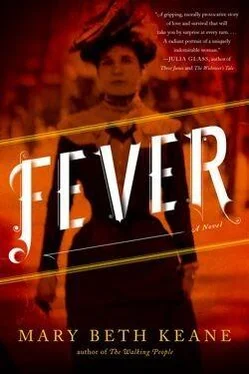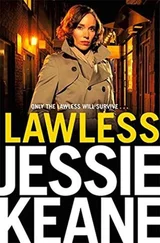She was in a patient’s room, lifting the top off a plate of braised beef, when the thought came through her like a tremor. A nurse breezed in, brushed by Mary, checked the patient’s pulse, peeked into the bassinet to check on the baby, and noticed Mary. “Oh God, not you, too,” she said, helping Mary to a chair. She held Mary’s wrist for a few moments. “Your pulse is fast.” She put the back of her hand to Mary’s head. “But you’ve no fever.”
“I’m all right,” Mary whispered. “Just tired.”
“You sure?”
“Is it sepsis?” Mary asked, trying to keep her voice steady. “Or something else?”
The young nurse sighed. “They thought sepsis at first, until so many came down with it, and now they’re thinking Typhoid.”
Mary felt her insides erupt into chaos. The nurse guided her back farther in the chair. “You should go home, Mary,”
“No, no,” she said. “I’ll be fine in a minute.”
The nurse flagged down a doctor and pointed to Mary.
“Go home, Mrs. Brown,” he told her. “If you feel well in the morning, then by all means come in, but otherwise stay home. We’ll cope without you.”
“I said I’m fine,” Mary said.
“Doctor’s orders.”
Too tired to argue, Mary gathered her things, left instructions for the woman helping out in the kitchen, and was out on the sidewalk before noon.
• • •
She should have gone straight uptown to Alfred, but she walked instead, and when she actually paid attention she noticed that she was covering dozens of blocks without noticing. She turned with the traffic, and felt herself slip into a kind of trance as she took in the storefronts, as she stepped around patches of ice, piles of horse shit that had been frozen, petrified, and would stay that way until the warm days of late March. It was February 1915, and she walked with her coat hanging open, her pale, white throat exposed to the cutting wind. She wanted to lie down and sleep but instead she kept walking, and walking, and finally, she was home.
She opened the door to their rooms at almost the same time as she did most evenings, and decided if he asked what was wrong with her, she wouldn’t tell him, wouldn’t worry him; he had enough to deal with at the moment. But when she pushed open the door and saw him in the same heap as she’d left him that morning, she almost laughed. No need to have worried. He hadn’t asked about her in weeks, not how the new situation was going, how she liked it, only when she’d get paid, when she’d get a chance to go downtown to visit that man again. She felt anger bubbling up in her belly and made no effort to quiet her movements as she filled the kettle with water, slammed it on the range to set it boiling for tea. Let him rot in there, she thought. I’m here working and worrying, and now this. Typhoid. Again. Jesus.
“Alfred,” she called sharply toward the open door of the bedroom. “Did you eat? Did you go out today?”
It felt like the old days, asking questions she already knew the answers to. She knew she was only setting herself up to pick a fight, and yet she couldn’t stop herself. What would they do now? How would he help? He had to snap out of it and get back with the Teamsters. He had to forget about his medicine entirely.
“Alfred!” she said again, slamming closed the window onto the airshaft. It was freezing in their rooms. She went into the bedroom and closed that window as well. She pulled open the curtains to let the last of the day’s dim light into the room.
“Get up,” she said, one hand on her hip, the other hand reaching down for the corner of the quilt. She had every intention of whipping it off him, yanking him to his feet, marching him around the neighborhood until he protested and gave her a little of the fight she needed if they were to keep going.
“Alfred?” she said, noticing, finally, that his face was gray, his lips tinged with blue. She dropped the edge of the quilt and touched his cheek, cold but not clammy. She dropped her face to his and felt for his breath. Run for help, she ordered herself and felt every small muscle in her body prepare to spring forward, propel her down to the sidewalk to hail a policeman, find a telephone. But all she could do was stare, and where a moment earlier her body had felt full of turmoil, now it felt perfectly still, like everything within her had paused, like a dancer who leaps and is suspended over the stage for one single second, halfway between one place and another but knowing she is on her way and will have arrived there as soon as she opens her eyes. Mary lifted the edge of the quilt and moved next to him, put her arm around his chest. As long as she stayed there, like that, as if they were sleeping, it hadn’t happened yet. As long as no one knew, and no one else came into their rooms, and they didn’t take him away. His pills were a mess, all over the desk as well as the drawer, and the needles he’d kept so clean and organized were separated, thrown here and there, mixed up with his dirty clothes, one propped inside an empty coffee mug. I should clean it all up, she thought, and realized she didn’t care.
“There’s Typhoid at the hospital,” she said, looking at the ceiling, worried that she was already forgetting what it felt like to hug him when he was warm, and feeling her heart throb when she thought she felt pressure back. But he didn’t say anything, and there was no pressure back, and after a few minutes, she walked to the grocer’s to call for help.
The doctor on the telephone told Mary that he’d come directly after supper, and true to his word, he buzzed around eight o’clock. After checking Alfred and confirming what Mary had told him when they spoke, he glanced around the room. “Is that his layout?” he asked, looking over at the open drawer, the pills and vials. Mary nodded and then pulled the covers up to Alfred’s chest, tucked them tightly all around. She still half-expected him to open his eyes. She kept thinking she saw him flinch. She stared at his blank face. She thought of the babies swaddled at the hospital, how contented they were when their blankets were wrapped tight.
“And you?” the doctor asked. He was younger than she by a decade, and reminded her of Mr. O’Neill, a young man dressed up in his father’s work clothes.
“What about me?”
“Do you take any of that stuff?” he walked over to the desk, pushed some of the pills around.
“Get away from that,” Mary said. She pushed the drawer shut.
The doctor shrugged. “The coroner will be by shortly,” he said just before he left.
She should be more upset, she decided, but discovered she was too tired to muster up the energy. It was difficult to understand that they would take him away, and that would be the last she’d see of him. Typhoid at the hospital. One was connected to the other — she felt as sure of that as she’d been sure that wearing a hat identical to Mrs. Bowen’s was what had sent her to North Brother. If she’d brought Typhoid to the hospital, to those new mothers, to those babies, then it was as they said, she’d brought it to the other places, too. She’d killed Tobias Kirkenbauer. A cold breeze rattled the panes of the window, and she looked down at Alfred again. She ran through their years together to think of who should be notified. Back and forth she went, and could come up with only half a dozen names. Among them, Liza Meaney. Her son. Fran. Joan. Jimmy Tiernan. Better not say anything at all, she decided, than have a funeral and face so few people, all impatient to get back to their lives. She opened the desk drawer again and rooted around for a pen and paper so she could list the things she had to do, and then as soon as the tip of the pen touched the paper she thought about how strange she was being, and how she’d better look at him again because it would be the last time. She turned to study him and realized that she didn’t know what she was looking for. More than his coloring, which made him seem more unfamiliar to her with every passing quarter hour, it was the fact that he hadn’t moved at all that upset her. Not a single finger, not a hair, not a cough or gasp or growl.
Читать дальше












